Auditing and Professional Practice 2: Opinion Types and Ethics
VerifiedAdded on 2020/03/16
|10
|1934
|85
Report
AI Summary
This report provides a comprehensive analysis of ethical breaches within the context of auditing and professional practice, specifically referencing the APES 110 code of ethics. The report examines various scenarios where ethical principles are violated, such as breaches of confidentiality, conflicts of interest, and improper marketing practices. Furthermore, the report delves into the different types of audit opinions that can be issued, including unqualified, qualified, and disclaimer of opinion, based on various audit findings and circumstances. The report analyzes specific cases where auditors are faced with limitations or uncertainties, and determines the appropriate type of audit opinion to be issued. The report also covers instances where the auditor's independence is compromised or where accounting standards are not followed. The report concludes by emphasizing the importance of ethical conduct and proper audit procedures in maintaining the integrity and reliability of financial reporting.
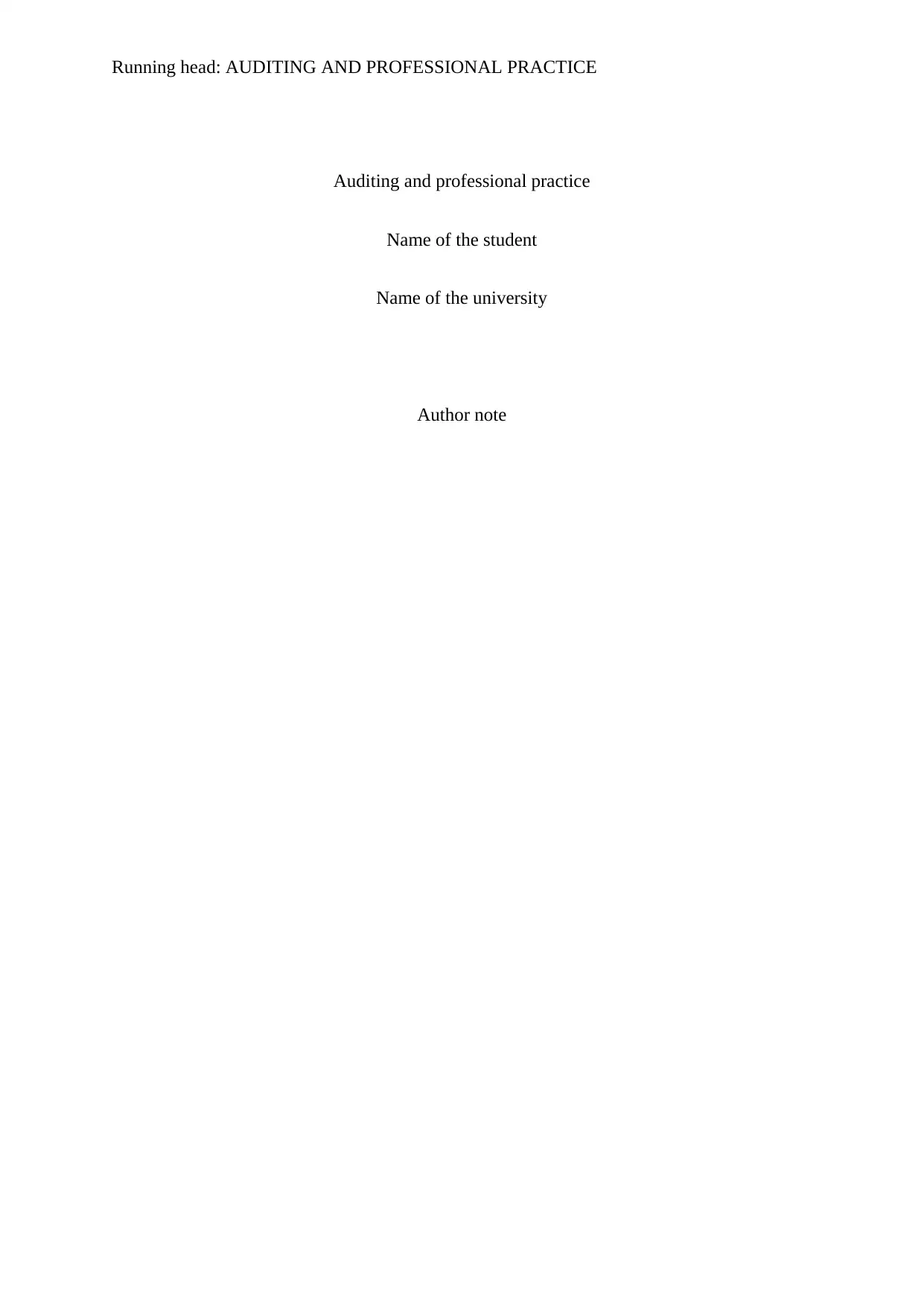
Running head: AUDITING AND PROFESSIONAL PRACTICE
Auditing and professional practice
Name of the student
Name of the university
Author note
Auditing and professional practice
Name of the student
Name of the university
Author note
Paraphrase This Document
Need a fresh take? Get an instant paraphrase of this document with our AI Paraphraser
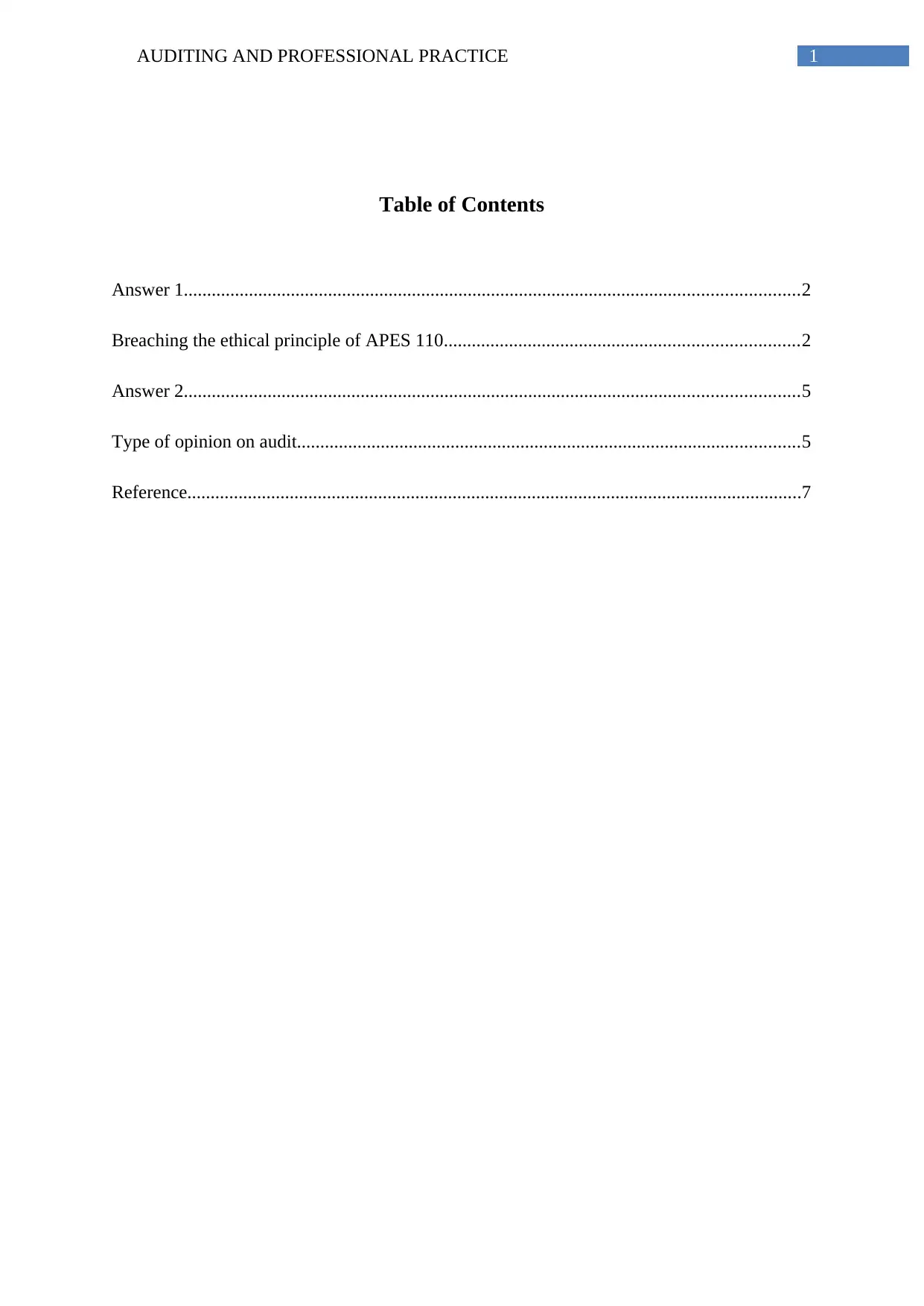
1AUDITING AND PROFESSIONAL PRACTICE
Table of Contents
Answer 1....................................................................................................................................2
Breaching the ethical principle of APES 110............................................................................2
Answer 2....................................................................................................................................5
Type of opinion on audit............................................................................................................5
Reference....................................................................................................................................7
Table of Contents
Answer 1....................................................................................................................................2
Breaching the ethical principle of APES 110............................................................................2
Answer 2....................................................................................................................................5
Type of opinion on audit............................................................................................................5
Reference....................................................................................................................................7
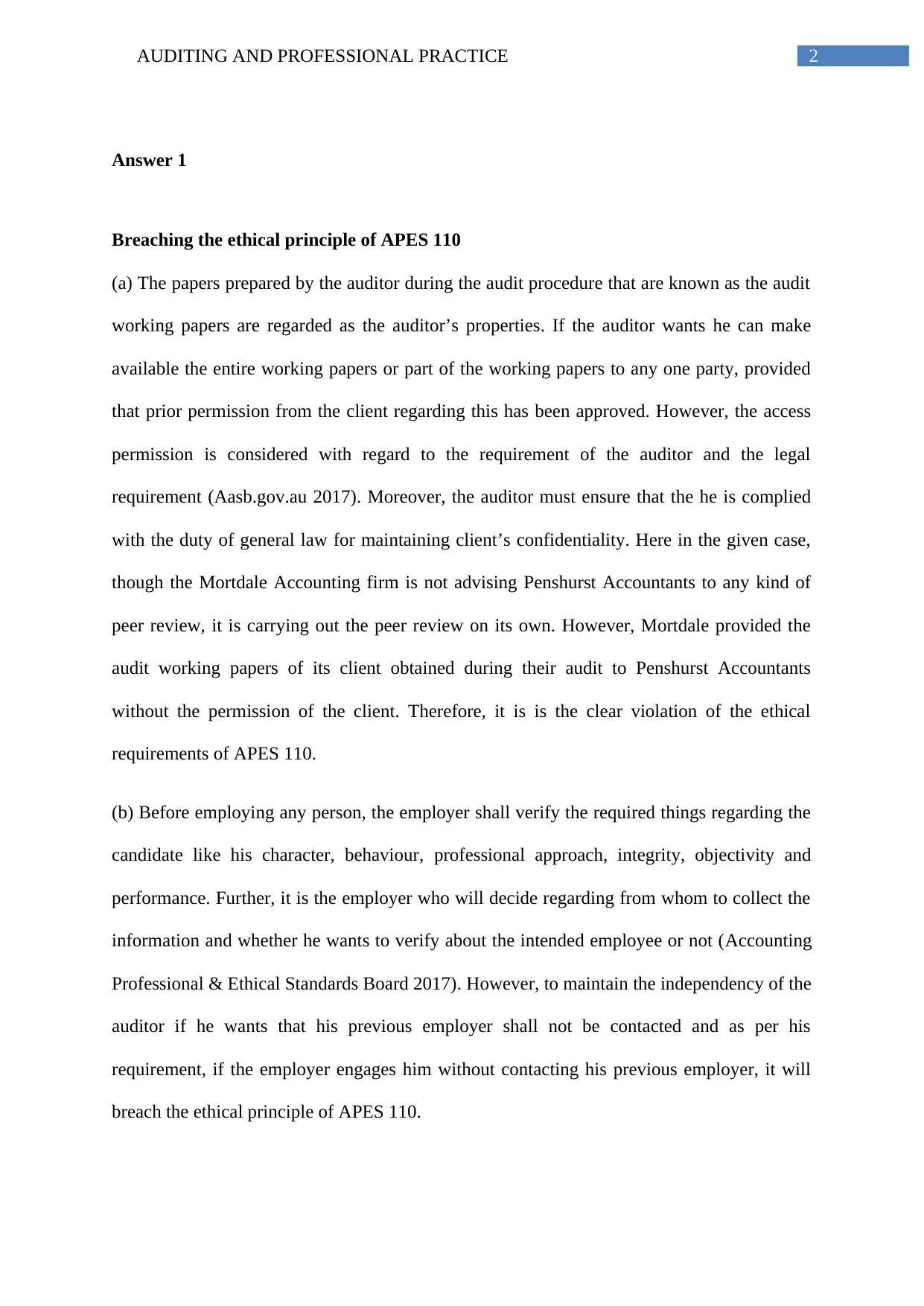
2AUDITING AND PROFESSIONAL PRACTICE
Answer 1
Breaching the ethical principle of APES 110
(a) The papers prepared by the auditor during the audit procedure that are known as the audit
working papers are regarded as the auditor’s properties. If the auditor wants he can make
available the entire working papers or part of the working papers to any one party, provided
that prior permission from the client regarding this has been approved. However, the access
permission is considered with regard to the requirement of the auditor and the legal
requirement (Aasb.gov.au 2017). Moreover, the auditor must ensure that the he is complied
with the duty of general law for maintaining client’s confidentiality. Here in the given case,
though the Mortdale Accounting firm is not advising Penshurst Accountants to any kind of
peer review, it is carrying out the peer review on its own. However, Mortdale provided the
audit working papers of its client obtained during their audit to Penshurst Accountants
without the permission of the client. Therefore, it is is the clear violation of the ethical
requirements of APES 110.
(b) Before employing any person, the employer shall verify the required things regarding the
candidate like his character, behaviour, professional approach, integrity, objectivity and
performance. Further, it is the employer who will decide regarding from whom to collect the
information and whether he wants to verify about the intended employee or not (Accounting
Professional & Ethical Standards Board 2017). However, to maintain the independency of the
auditor if he wants that his previous employer shall not be contacted and as per his
requirement, if the employer engages him without contacting his previous employer, it will
breach the ethical principle of APES 110.
Answer 1
Breaching the ethical principle of APES 110
(a) The papers prepared by the auditor during the audit procedure that are known as the audit
working papers are regarded as the auditor’s properties. If the auditor wants he can make
available the entire working papers or part of the working papers to any one party, provided
that prior permission from the client regarding this has been approved. However, the access
permission is considered with regard to the requirement of the auditor and the legal
requirement (Aasb.gov.au 2017). Moreover, the auditor must ensure that the he is complied
with the duty of general law for maintaining client’s confidentiality. Here in the given case,
though the Mortdale Accounting firm is not advising Penshurst Accountants to any kind of
peer review, it is carrying out the peer review on its own. However, Mortdale provided the
audit working papers of its client obtained during their audit to Penshurst Accountants
without the permission of the client. Therefore, it is is the clear violation of the ethical
requirements of APES 110.
(b) Before employing any person, the employer shall verify the required things regarding the
candidate like his character, behaviour, professional approach, integrity, objectivity and
performance. Further, it is the employer who will decide regarding from whom to collect the
information and whether he wants to verify about the intended employee or not (Accounting
Professional & Ethical Standards Board 2017). However, to maintain the independency of the
auditor if he wants that his previous employer shall not be contacted and as per his
requirement, if the employer engages him without contacting his previous employer, it will
breach the ethical principle of APES 110.
⊘ This is a preview!⊘
Do you want full access?
Subscribe today to unlock all pages.

Trusted by 1+ million students worldwide
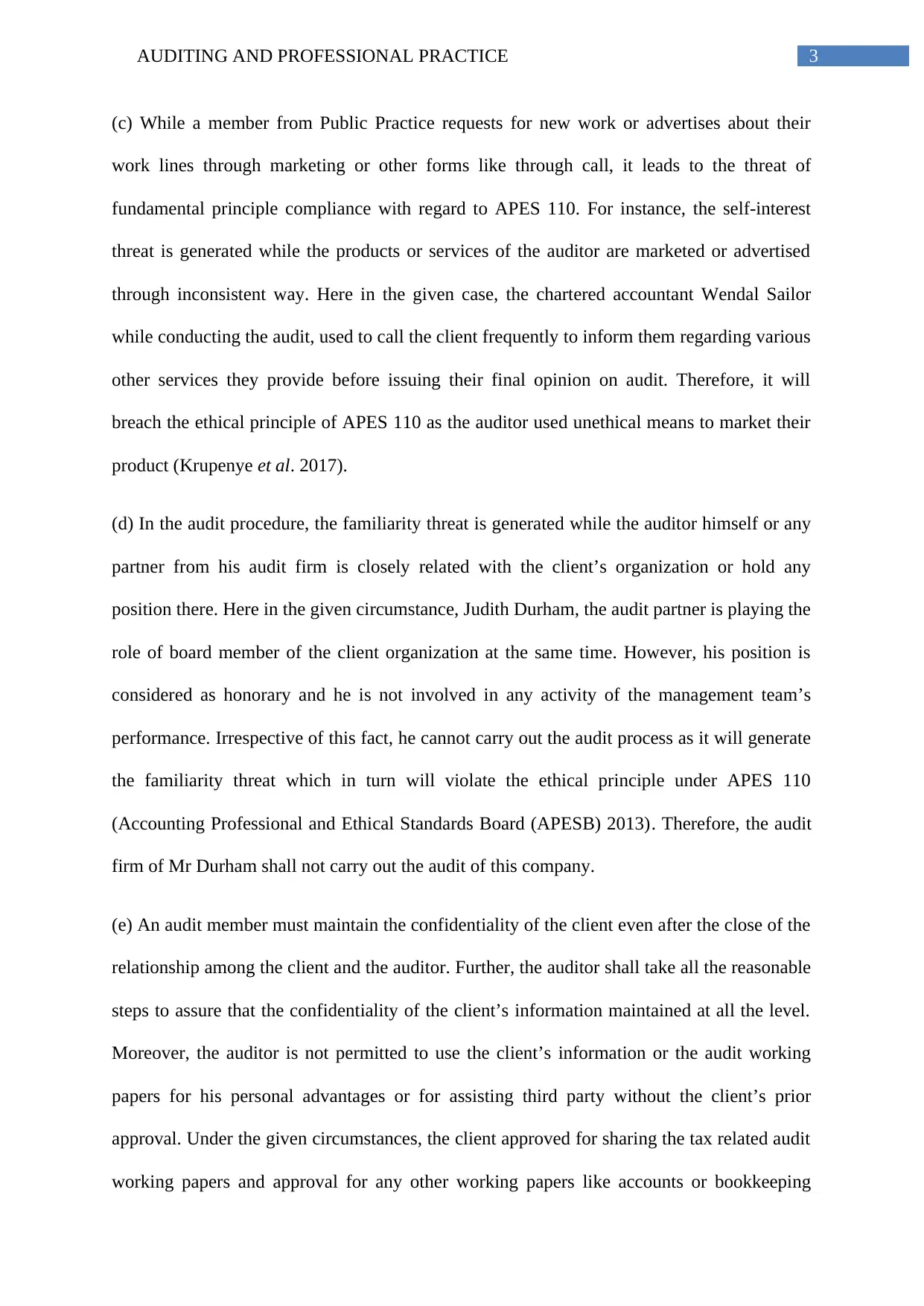
3AUDITING AND PROFESSIONAL PRACTICE
(c) While a member from Public Practice requests for new work or advertises about their
work lines through marketing or other forms like through call, it leads to the threat of
fundamental principle compliance with regard to APES 110. For instance, the self-interest
threat is generated while the products or services of the auditor are marketed or advertised
through inconsistent way. Here in the given case, the chartered accountant Wendal Sailor
while conducting the audit, used to call the client frequently to inform them regarding various
other services they provide before issuing their final opinion on audit. Therefore, it will
breach the ethical principle of APES 110 as the auditor used unethical means to market their
product (Krupenye et al. 2017).
(d) In the audit procedure, the familiarity threat is generated while the auditor himself or any
partner from his audit firm is closely related with the client’s organization or hold any
position there. Here in the given circumstance, Judith Durham, the audit partner is playing the
role of board member of the client organization at the same time. However, his position is
considered as honorary and he is not involved in any activity of the management team’s
performance. Irrespective of this fact, he cannot carry out the audit process as it will generate
the familiarity threat which in turn will violate the ethical principle under APES 110
(Accounting Professional and Ethical Standards Board (APESB) 2013). Therefore, the audit
firm of Mr Durham shall not carry out the audit of this company.
(e) An audit member must maintain the confidentiality of the client even after the close of the
relationship among the client and the auditor. Further, the auditor shall take all the reasonable
steps to assure that the confidentiality of the client’s information maintained at all the level.
Moreover, the auditor is not permitted to use the client’s information or the audit working
papers for his personal advantages or for assisting third party without the client’s prior
approval. Under the given circumstances, the client approved for sharing the tax related audit
working papers and approval for any other working papers like accounts or bookkeeping
(c) While a member from Public Practice requests for new work or advertises about their
work lines through marketing or other forms like through call, it leads to the threat of
fundamental principle compliance with regard to APES 110. For instance, the self-interest
threat is generated while the products or services of the auditor are marketed or advertised
through inconsistent way. Here in the given case, the chartered accountant Wendal Sailor
while conducting the audit, used to call the client frequently to inform them regarding various
other services they provide before issuing their final opinion on audit. Therefore, it will
breach the ethical principle of APES 110 as the auditor used unethical means to market their
product (Krupenye et al. 2017).
(d) In the audit procedure, the familiarity threat is generated while the auditor himself or any
partner from his audit firm is closely related with the client’s organization or hold any
position there. Here in the given circumstance, Judith Durham, the audit partner is playing the
role of board member of the client organization at the same time. However, his position is
considered as honorary and he is not involved in any activity of the management team’s
performance. Irrespective of this fact, he cannot carry out the audit process as it will generate
the familiarity threat which in turn will violate the ethical principle under APES 110
(Accounting Professional and Ethical Standards Board (APESB) 2013). Therefore, the audit
firm of Mr Durham shall not carry out the audit of this company.
(e) An audit member must maintain the confidentiality of the client even after the close of the
relationship among the client and the auditor. Further, the auditor shall take all the reasonable
steps to assure that the confidentiality of the client’s information maintained at all the level.
Moreover, the auditor is not permitted to use the client’s information or the audit working
papers for his personal advantages or for assisting third party without the client’s prior
approval. Under the given circumstances, the client approved for sharing the tax related audit
working papers and approval for any other working papers like accounts or bookkeeping
Paraphrase This Document
Need a fresh take? Get an instant paraphrase of this document with our AI Paraphraser
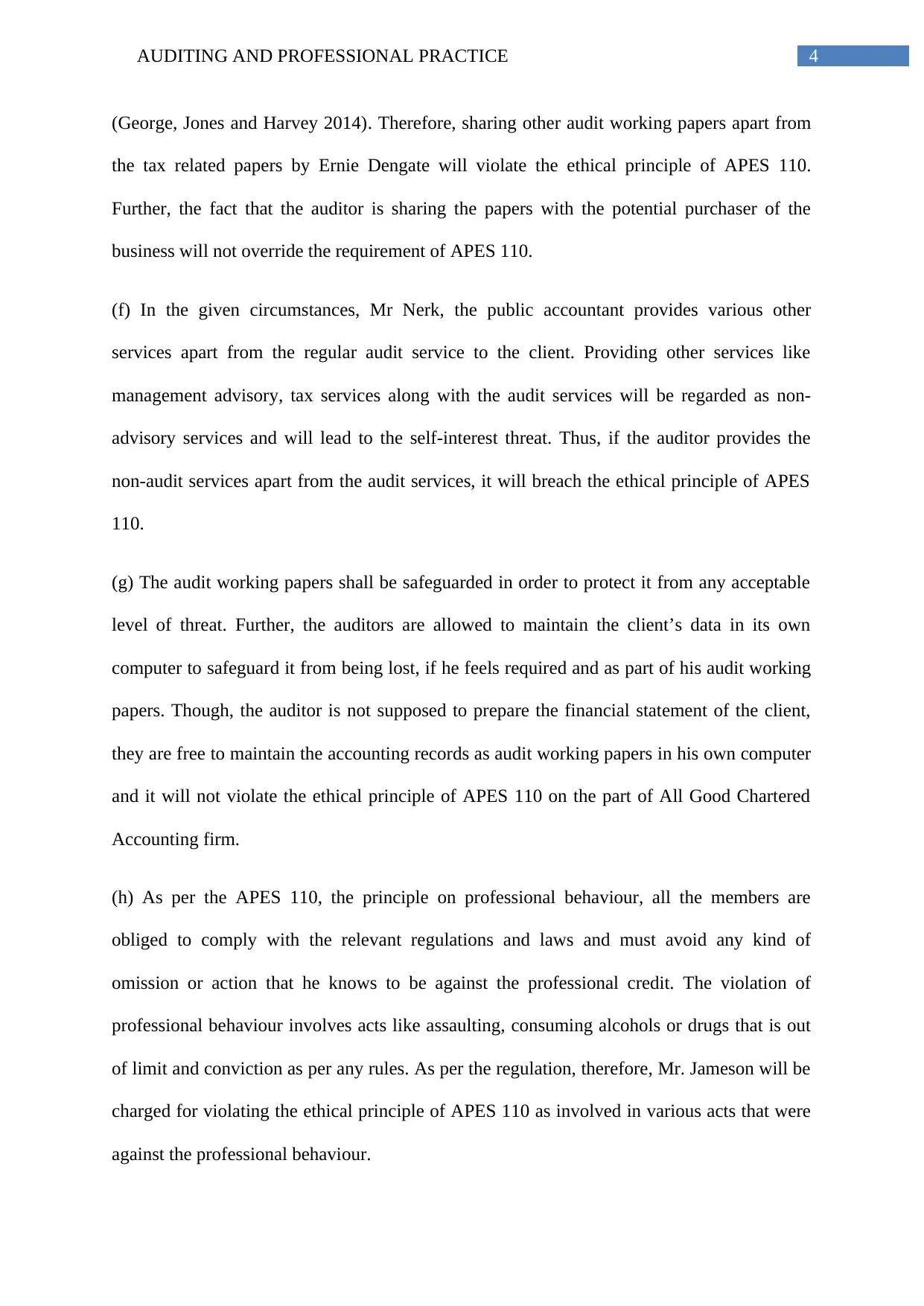
4AUDITING AND PROFESSIONAL PRACTICE
(George, Jones and Harvey 2014). Therefore, sharing other audit working papers apart from
the tax related papers by Ernie Dengate will violate the ethical principle of APES 110.
Further, the fact that the auditor is sharing the papers with the potential purchaser of the
business will not override the requirement of APES 110.
(f) In the given circumstances, Mr Nerk, the public accountant provides various other
services apart from the regular audit service to the client. Providing other services like
management advisory, tax services along with the audit services will be regarded as non-
advisory services and will lead to the self-interest threat. Thus, if the auditor provides the
non-audit services apart from the audit services, it will breach the ethical principle of APES
110.
(g) The audit working papers shall be safeguarded in order to protect it from any acceptable
level of threat. Further, the auditors are allowed to maintain the client’s data in its own
computer to safeguard it from being lost, if he feels required and as part of his audit working
papers. Though, the auditor is not supposed to prepare the financial statement of the client,
they are free to maintain the accounting records as audit working papers in his own computer
and it will not violate the ethical principle of APES 110 on the part of All Good Chartered
Accounting firm.
(h) As per the APES 110, the principle on professional behaviour, all the members are
obliged to comply with the relevant regulations and laws and must avoid any kind of
omission or action that he knows to be against the professional credit. The violation of
professional behaviour involves acts like assaulting, consuming alcohols or drugs that is out
of limit and conviction as per any rules. As per the regulation, therefore, Mr. Jameson will be
charged for violating the ethical principle of APES 110 as involved in various acts that were
against the professional behaviour.
(George, Jones and Harvey 2014). Therefore, sharing other audit working papers apart from
the tax related papers by Ernie Dengate will violate the ethical principle of APES 110.
Further, the fact that the auditor is sharing the papers with the potential purchaser of the
business will not override the requirement of APES 110.
(f) In the given circumstances, Mr Nerk, the public accountant provides various other
services apart from the regular audit service to the client. Providing other services like
management advisory, tax services along with the audit services will be regarded as non-
advisory services and will lead to the self-interest threat. Thus, if the auditor provides the
non-audit services apart from the audit services, it will breach the ethical principle of APES
110.
(g) The audit working papers shall be safeguarded in order to protect it from any acceptable
level of threat. Further, the auditors are allowed to maintain the client’s data in its own
computer to safeguard it from being lost, if he feels required and as part of his audit working
papers. Though, the auditor is not supposed to prepare the financial statement of the client,
they are free to maintain the accounting records as audit working papers in his own computer
and it will not violate the ethical principle of APES 110 on the part of All Good Chartered
Accounting firm.
(h) As per the APES 110, the principle on professional behaviour, all the members are
obliged to comply with the relevant regulations and laws and must avoid any kind of
omission or action that he knows to be against the professional credit. The violation of
professional behaviour involves acts like assaulting, consuming alcohols or drugs that is out
of limit and conviction as per any rules. As per the regulation, therefore, Mr. Jameson will be
charged for violating the ethical principle of APES 110 as involved in various acts that were
against the professional behaviour.
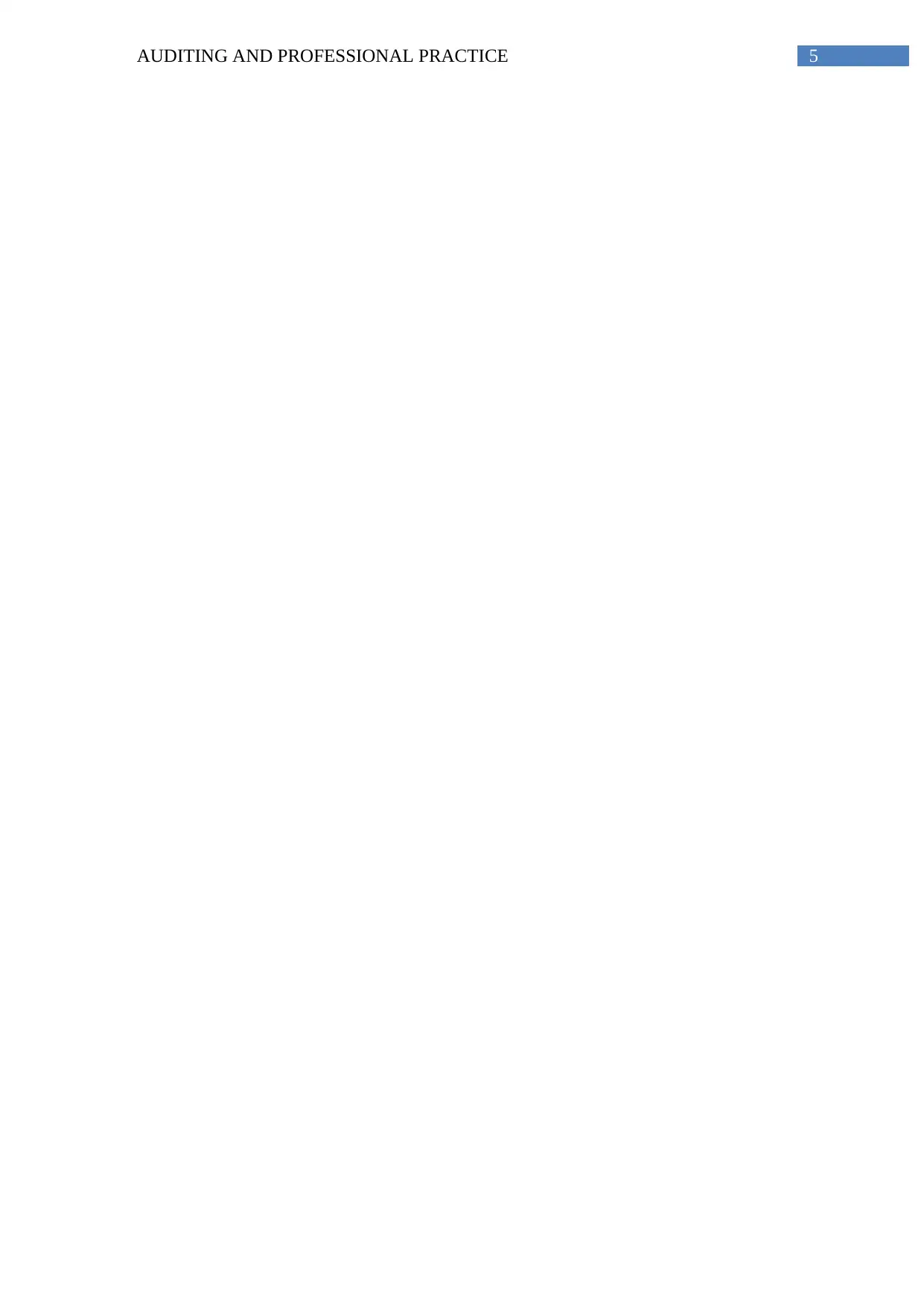
5AUDITING AND PROFESSIONAL PRACTICE
⊘ This is a preview!⊘
Do you want full access?
Subscribe today to unlock all pages.

Trusted by 1+ million students worldwide
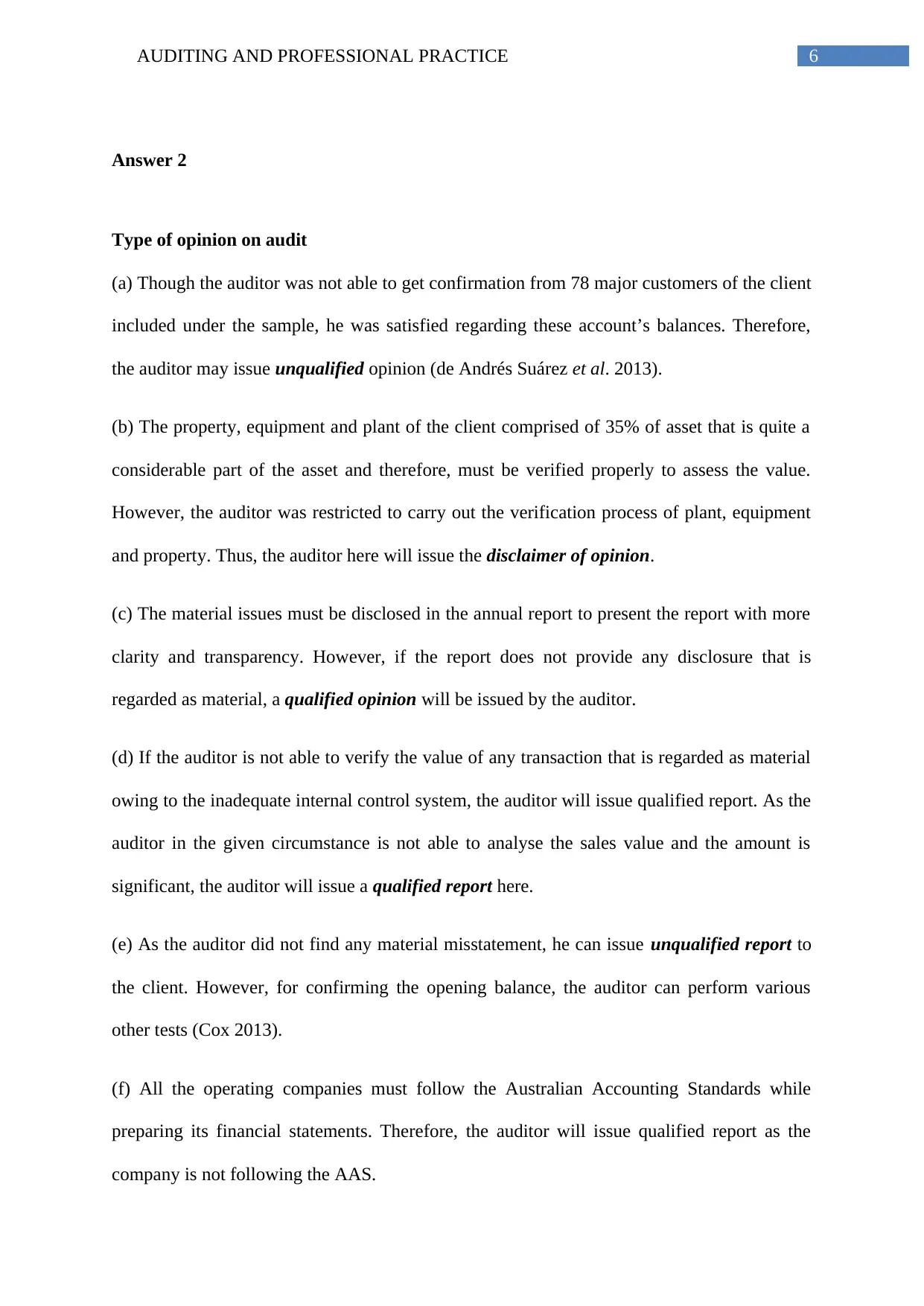
6AUDITING AND PROFESSIONAL PRACTICE
Answer 2
Type of opinion on audit
(a) Though the auditor was not able to get confirmation from 78 major customers of the client
included under the sample, he was satisfied regarding these account’s balances. Therefore,
the auditor may issue unqualified opinion (de Andrés Suárez et al. 2013).
(b) The property, equipment and plant of the client comprised of 35% of asset that is quite a
considerable part of the asset and therefore, must be verified properly to assess the value.
However, the auditor was restricted to carry out the verification process of plant, equipment
and property. Thus, the auditor here will issue the disclaimer of opinion.
(c) The material issues must be disclosed in the annual report to present the report with more
clarity and transparency. However, if the report does not provide any disclosure that is
regarded as material, a qualified opinion will be issued by the auditor.
(d) If the auditor is not able to verify the value of any transaction that is regarded as material
owing to the inadequate internal control system, the auditor will issue qualified report. As the
auditor in the given circumstance is not able to analyse the sales value and the amount is
significant, the auditor will issue a qualified report here.
(e) As the auditor did not find any material misstatement, he can issue unqualified report to
the client. However, for confirming the opening balance, the auditor can perform various
other tests (Cox 2013).
(f) All the operating companies must follow the Australian Accounting Standards while
preparing its financial statements. Therefore, the auditor will issue qualified report as the
company is not following the AAS.
Answer 2
Type of opinion on audit
(a) Though the auditor was not able to get confirmation from 78 major customers of the client
included under the sample, he was satisfied regarding these account’s balances. Therefore,
the auditor may issue unqualified opinion (de Andrés Suárez et al. 2013).
(b) The property, equipment and plant of the client comprised of 35% of asset that is quite a
considerable part of the asset and therefore, must be verified properly to assess the value.
However, the auditor was restricted to carry out the verification process of plant, equipment
and property. Thus, the auditor here will issue the disclaimer of opinion.
(c) The material issues must be disclosed in the annual report to present the report with more
clarity and transparency. However, if the report does not provide any disclosure that is
regarded as material, a qualified opinion will be issued by the auditor.
(d) If the auditor is not able to verify the value of any transaction that is regarded as material
owing to the inadequate internal control system, the auditor will issue qualified report. As the
auditor in the given circumstance is not able to analyse the sales value and the amount is
significant, the auditor will issue a qualified report here.
(e) As the auditor did not find any material misstatement, he can issue unqualified report to
the client. However, for confirming the opening balance, the auditor can perform various
other tests (Cox 2013).
(f) All the operating companies must follow the Australian Accounting Standards while
preparing its financial statements. Therefore, the auditor will issue qualified report as the
company is not following the AAS.
Paraphrase This Document
Need a fresh take? Get an instant paraphrase of this document with our AI Paraphraser
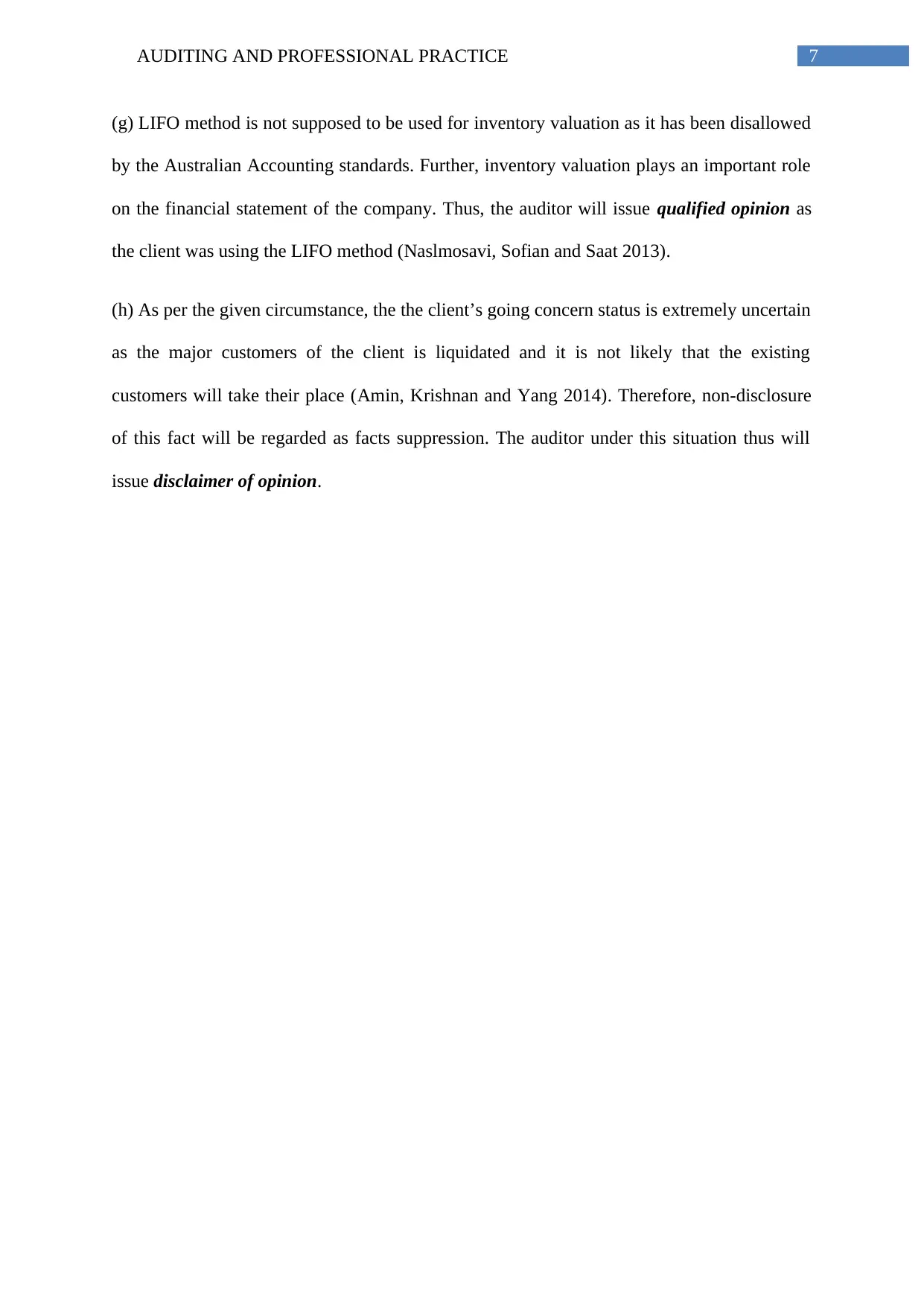
7AUDITING AND PROFESSIONAL PRACTICE
(g) LIFO method is not supposed to be used for inventory valuation as it has been disallowed
by the Australian Accounting standards. Further, inventory valuation plays an important role
on the financial statement of the company. Thus, the auditor will issue qualified opinion as
the client was using the LIFO method (Naslmosavi, Sofian and Saat 2013).
(h) As per the given circumstance, the the client’s going concern status is extremely uncertain
as the major customers of the client is liquidated and it is not likely that the existing
customers will take their place (Amin, Krishnan and Yang 2014). Therefore, non-disclosure
of this fact will be regarded as facts suppression. The auditor under this situation thus will
issue disclaimer of opinion.
(g) LIFO method is not supposed to be used for inventory valuation as it has been disallowed
by the Australian Accounting standards. Further, inventory valuation plays an important role
on the financial statement of the company. Thus, the auditor will issue qualified opinion as
the client was using the LIFO method (Naslmosavi, Sofian and Saat 2013).
(h) As per the given circumstance, the the client’s going concern status is extremely uncertain
as the major customers of the client is liquidated and it is not likely that the existing
customers will take their place (Amin, Krishnan and Yang 2014). Therefore, non-disclosure
of this fact will be regarded as facts suppression. The auditor under this situation thus will
issue disclaimer of opinion.
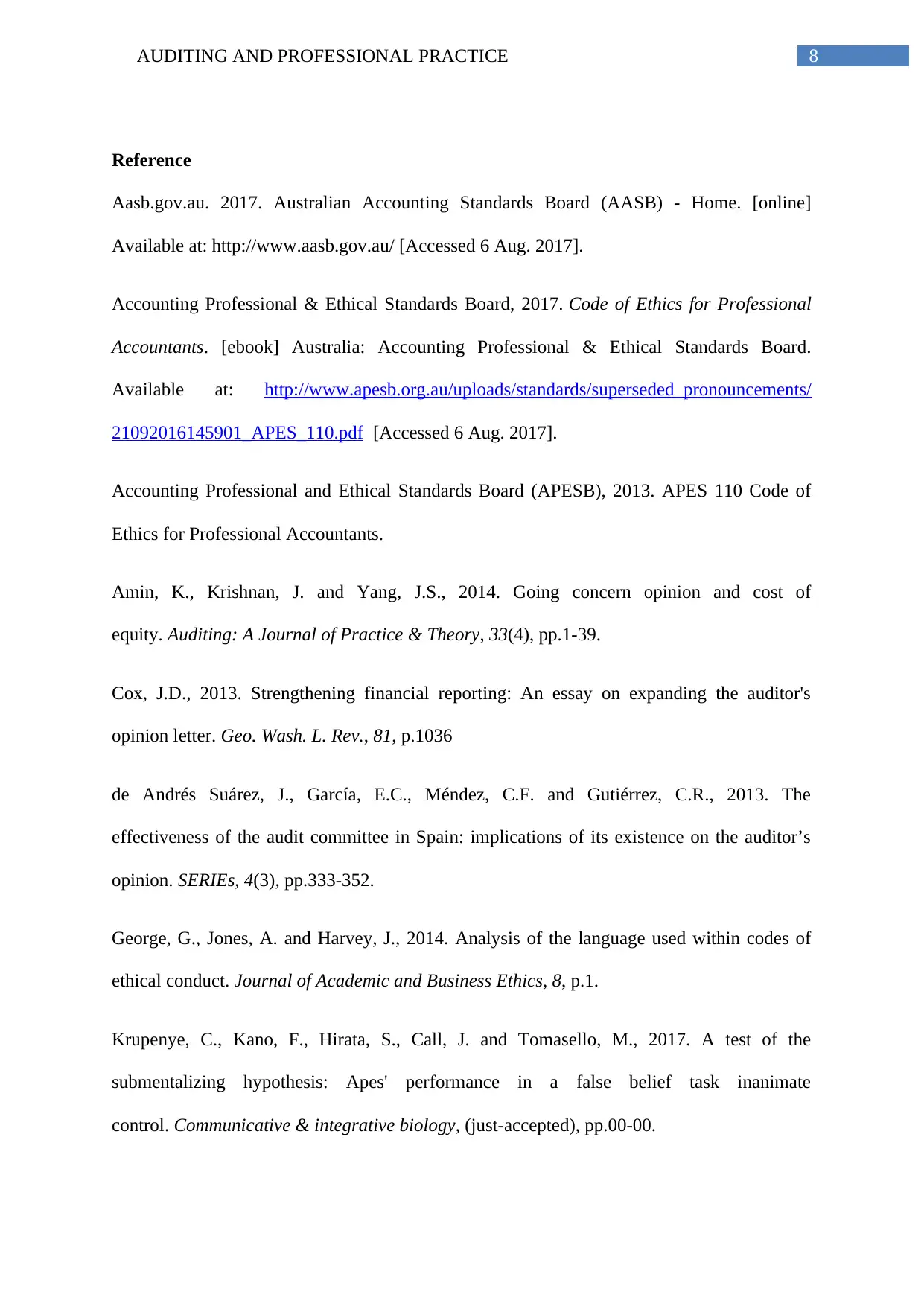
8AUDITING AND PROFESSIONAL PRACTICE
Reference
Aasb.gov.au. 2017. Australian Accounting Standards Board (AASB) - Home. [online]
Available at: http://www.aasb.gov.au/ [Accessed 6 Aug. 2017].
Accounting Professional & Ethical Standards Board, 2017. Code of Ethics for Professional
Accountants. [ebook] Australia: Accounting Professional & Ethical Standards Board.
Available at: http://www.apesb.org.au/uploads/standards/superseded_pronouncements/
21092016145901_APES_110.pdf [Accessed 6 Aug. 2017].
Accounting Professional and Ethical Standards Board (APESB), 2013. APES 110 Code of
Ethics for Professional Accountants.
Amin, K., Krishnan, J. and Yang, J.S., 2014. Going concern opinion and cost of
equity. Auditing: A Journal of Practice & Theory, 33(4), pp.1-39.
Cox, J.D., 2013. Strengthening financial reporting: An essay on expanding the auditor's
opinion letter. Geo. Wash. L. Rev., 81, p.1036
de Andrés Suárez, J., García, E.C., Méndez, C.F. and Gutiérrez, C.R., 2013. The
effectiveness of the audit committee in Spain: implications of its existence on the auditor’s
opinion. SERIEs, 4(3), pp.333-352.
George, G., Jones, A. and Harvey, J., 2014. Analysis of the language used within codes of
ethical conduct. Journal of Academic and Business Ethics, 8, p.1.
Krupenye, C., Kano, F., Hirata, S., Call, J. and Tomasello, M., 2017. A test of the
submentalizing hypothesis: Apes' performance in a false belief task inanimate
control. Communicative & integrative biology, (just-accepted), pp.00-00.
Reference
Aasb.gov.au. 2017. Australian Accounting Standards Board (AASB) - Home. [online]
Available at: http://www.aasb.gov.au/ [Accessed 6 Aug. 2017].
Accounting Professional & Ethical Standards Board, 2017. Code of Ethics for Professional
Accountants. [ebook] Australia: Accounting Professional & Ethical Standards Board.
Available at: http://www.apesb.org.au/uploads/standards/superseded_pronouncements/
21092016145901_APES_110.pdf [Accessed 6 Aug. 2017].
Accounting Professional and Ethical Standards Board (APESB), 2013. APES 110 Code of
Ethics for Professional Accountants.
Amin, K., Krishnan, J. and Yang, J.S., 2014. Going concern opinion and cost of
equity. Auditing: A Journal of Practice & Theory, 33(4), pp.1-39.
Cox, J.D., 2013. Strengthening financial reporting: An essay on expanding the auditor's
opinion letter. Geo. Wash. L. Rev., 81, p.1036
de Andrés Suárez, J., García, E.C., Méndez, C.F. and Gutiérrez, C.R., 2013. The
effectiveness of the audit committee in Spain: implications of its existence on the auditor’s
opinion. SERIEs, 4(3), pp.333-352.
George, G., Jones, A. and Harvey, J., 2014. Analysis of the language used within codes of
ethical conduct. Journal of Academic and Business Ethics, 8, p.1.
Krupenye, C., Kano, F., Hirata, S., Call, J. and Tomasello, M., 2017. A test of the
submentalizing hypothesis: Apes' performance in a false belief task inanimate
control. Communicative & integrative biology, (just-accepted), pp.00-00.
⊘ This is a preview!⊘
Do you want full access?
Subscribe today to unlock all pages.

Trusted by 1+ million students worldwide
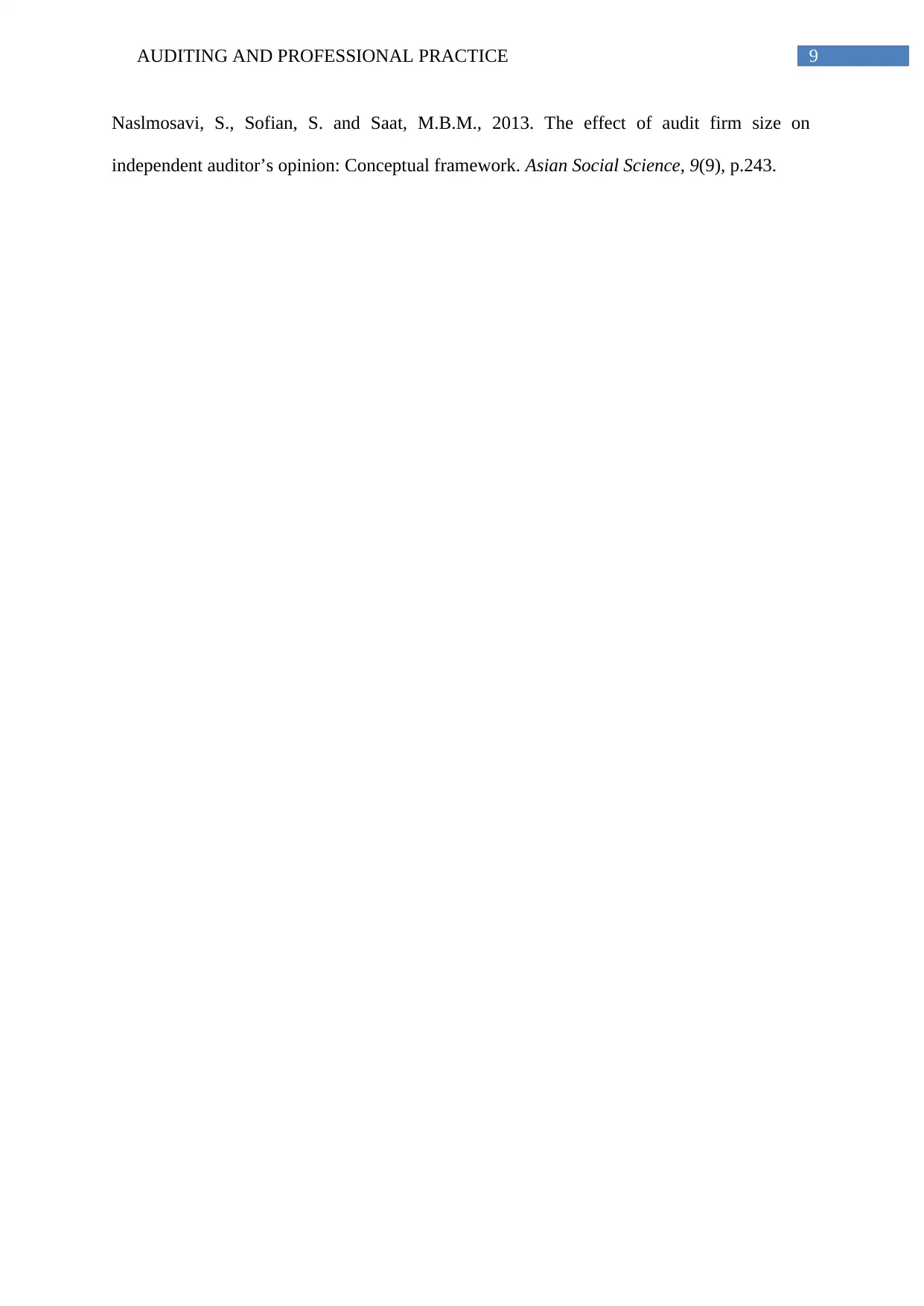
9AUDITING AND PROFESSIONAL PRACTICE
Naslmosavi, S., Sofian, S. and Saat, M.B.M., 2013. The effect of audit firm size on
independent auditor’s opinion: Conceptual framework. Asian Social Science, 9(9), p.243.
Naslmosavi, S., Sofian, S. and Saat, M.B.M., 2013. The effect of audit firm size on
independent auditor’s opinion: Conceptual framework. Asian Social Science, 9(9), p.243.
1 out of 10
Related Documents
Your All-in-One AI-Powered Toolkit for Academic Success.
+13062052269
info@desklib.com
Available 24*7 on WhatsApp / Email
![[object Object]](/_next/static/media/star-bottom.7253800d.svg)
Unlock your academic potential
Copyright © 2020–2026 A2Z Services. All Rights Reserved. Developed and managed by ZUCOL.



